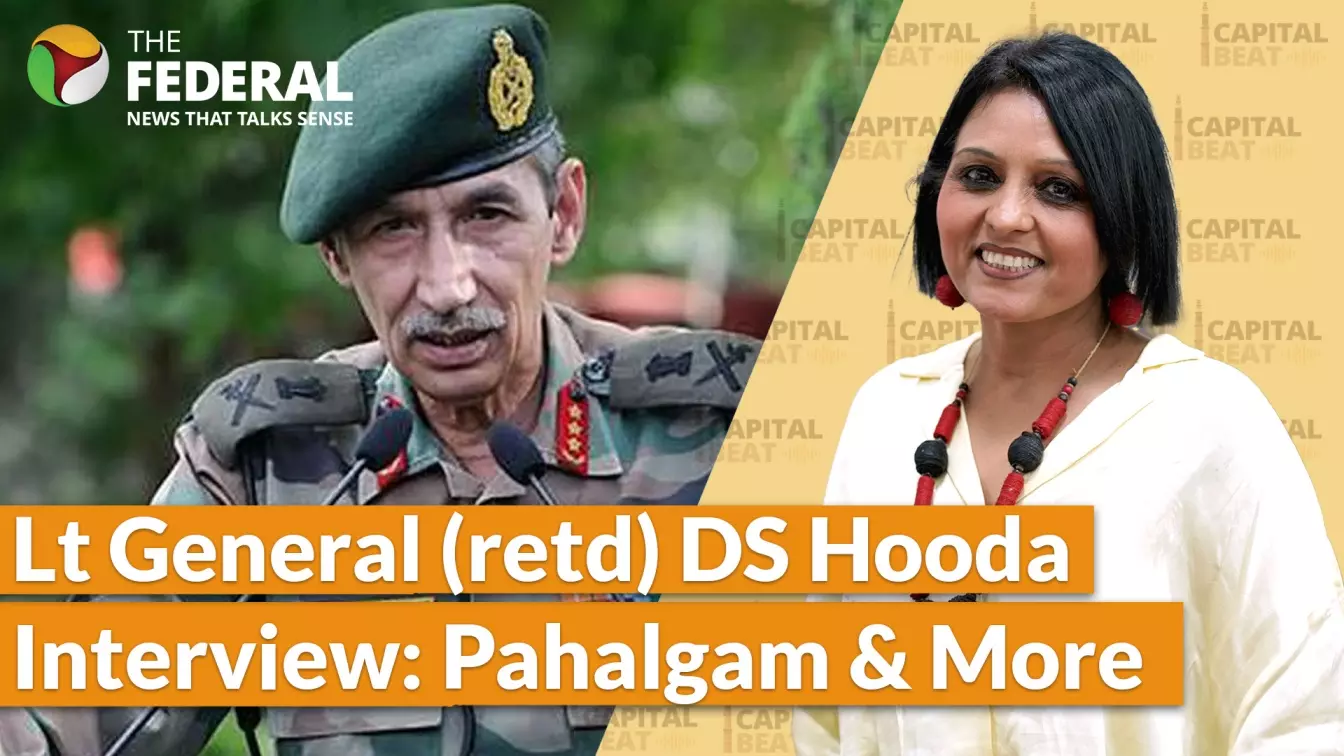
Lt General (retd) DS Hooda Interview
'India likely to consider limited, kinetic operation against Pak over Pahalgam'
We must be prepared for Pakistani retaliation, but a calculated, limited strike seems more realistic than a broader conflict, says Lt General (Retd) DS Hooda

In the latest episode of Capital Beat, The Federal speaks to Lt General (Retd) DS Hooda about India’s possible military response to the Pahalgam terror attack, the security and intelligence failures that enabled it, and how the media and government must respond with maturity.
Hooda, former Northern Army Commander, also unpacks the revamped National Security Advisory Board and how India must navigate multiple geopolitical fronts with caution.
Do you believe the government is seriously planning a military strike after Pahalgam?
It’s clear the military option is being considered. We've already seen some initial steps — revoking the Indus Water Treaty, cancelling visas, and border shutdowns. The Prime Minister has met the service chiefs and told them they are free to plan operations. Whether or not the option is exercised, and in what form, is yet to be seen. But like after Pulwama, military force is clearly on the table.
The National Security Advisory Board has been reconstituted. Is this a response to policy failure?
I wouldn’t say the previous members were ineffective. What we’re seeing is the government responding to a new challenge.
Journalists asking about security lapses are not being anti-national — they’re doing their job. That should not be criminalised or censored.
Bringing in expertise from all three services, along with recently retired diplomats and officers, ensures a more current and updated view of security issues. It could also indicate that the NSAB may be tasked with crafting a long-term strategy on Pakistan, beyond just a tactical military response.
Do you think India is planning a full-fledged war or something more limited?
I don’t foresee a full-scale war. That’s not in India’s national interest. The government is likely considering a limited, kinetic operation. Of course, escalation is always a risk, and we must be prepared for Pakistani retaliation. But a calculated, limited strike seems more realistic than a broader conflict.
Pakistan is asking for credible evidence, but India has blamed it directly. Is that justified?
We can’t expect terrorists to carry ISI phone numbers on them. TRF has claimed responsibility — it’s a known Lashkar-e-Taiba front. The scale and planning involved clearly suggest this wasn’t the work of a local outfit. Yes, they may have had help from local overground workers, but such a large-scale attack would not have been executed without high-level planning, and that points across the border.
Was the attack a deliberate provocation by Pakistan?
Absolutely. This was done with full awareness of the consequences. The Pakistan Army is under internal pressure — from militants, the public, China over the CPEC corridor — and also facing criticism for removing Imran Khan. This provocation serves multiple goals for them. Targeting a specific community also indicates a strategic intention to deepen social divides within India.
How do you assess the intelligence and security failure on India’s part?
There was clearly a lapse. No security presence in an area swarming with tourists? That’s unacceptable. The government has admitted to a security failure. However, while this attack is horrific, we must be cautious about overstating its implications. It doesn't mean all gains in the Valley are undone, or that massive terror resurgence is imminent. That narrative only helps terrorists.
Can journalists ask tough questions at such a sensitive time without being labelled anti-national?
They must. Governments should be transparent and open to questions. Admitting failures helps build solutions. Journalists asking about security lapses are not being anti-national — they’re doing their job. That should not be criminalised or censored.
But where should accountability lie for this failure?
That’s for the government to determine. It depends on who had the intelligence, who ignored it, who made the decision to open up the area without security. These are serious questions. Wherever the buck stops, someone must be held accountable.
Should the media stop showing footage of military movements and border buildups?
Live operational coverage is a red line — it risks compromising troop movement and gives the enemy real-time intel. As for general build-up footage, the media must weigh sensationalism against national interest. Eyeballs are important, but not at the cost of operational secrecy.
Should the media focus on raising questions or just back the government for now?
This is a time for unity. Let the government decide the response. They have experienced military leaders advising them. Also, decisions must not be influenced by the noise on social media. Strategic thinking — not reactionary hashtags — must guide our national response.
But what if that noise comes from elected leaders — like BJP MP Nishikant Dubey claiming Pakistan will cease to exist by 2025?
I won’t comment on political statements. My point is this: do not let social media pressure — even from prominent figures — shape decisions on war and peace. Such choices must come from cold, strategic calculation.
Does Pahalgam open up multiple geopolitical challenges for India — from Pakistan, China, even Bangladesh?
Certainly. The timing complicates things. Bangladesh was never this hostile. China is still tense though manageable. But will this limit India’s military options against Pakistan? I don’t think so. These other fronts are serious but not enough to deter a targeted strike if India deems it necessary.
Let the government act. Let the military assess. Let’s not fall into reactionary traps. This is a horrific tragedy — one that needs a measured, unified, and strategic response.
The content above has been generated using a fine-tuned AI model. To ensure accuracy, quality, and editorial integrity, we employ a Human-In-The-Loop (HITL) process. While AI assists in creating the initial draft, our experienced editorial team carefully reviews, edits, and refines the content before publication. At The Federal, we combine the efficiency of AI with the expertise of human editors to deliver reliable and insightful journalism.

